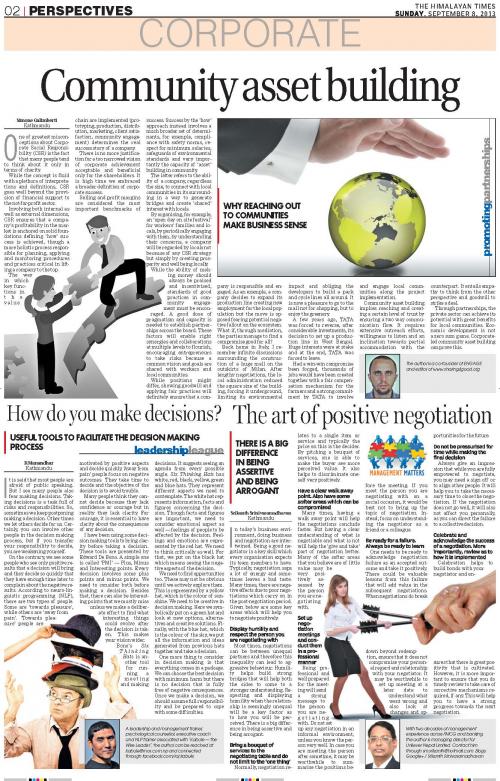
Involving both internal as well as external dimensions, CSR ensures that a company’s profitability in the market is anchored on solid foundations defining “HOW” success is achieved, though a more holistic process responsible for planning, applying and monitoring procedures and practices critical in lifting a company to the top.
The way in which key functions in the value chain are implemented (prototyping, production, distribution, marketing, client satisfaction, community engagement) determines the real success story of a company.
There is no more justification for a too narrowed vision of corporate achievement acceptable and beneficial only for the shareholders. It is high time we embraced a broader definition of corporate success.
Selling and profit margins are considered the most important benchmarks of success.
Success by the “HOW” approach instead involves a much broader set of determinants, e.g. compliance with safety norms, respect for minimum salaries, safeguards of environmental standards and very importantly the capacity of“ asset” building in community.
The latter refers to the ability of a company, regardless the size, to connect with local communities in its surrounding in a way to generate bridges and create “shared” interest with locals.
By organizing, for example an “open day on site festival” for workers’ families and locals, by periodically engaging with them, by understanding their concerns, a company will be regarded bylocals not because of any CSR strategy but simply by creating prosperity and well being locally.
While the ability of making money should always be praised and incentivized, standards of good practices in community engagement must be encouraged. A good dose of pragmatism and capacity is needed to establish partnerships across the board. These factors will enable right synergies and collaborations at multiple levels to flourish, encouraging entrepreneurs to take risks because a common vision and goals are shared with workers and local communities.
While positions might differ, showing good will and applying fair practices will definitely ensure that a company is responsible and engaged. As an example a company decides to expand its production line creating new employment for the local population but the move is opposed fearing potential negative fallout on the ecosystem. What if, through mediation, the parties manage to find a compromise good for all?
Back home in Italy, I remember infinite discussions surrounding the construction of a huge mall in the outskirts of Milan. After lengthy negotiations the local administration reduced the square size of the building, forcing it underground, limiting its environmental impact and obliging the developers to build a park and cycle lines all around. It is now a pleasure to go to the mall not for shopping but to enjoy the greenery.
A few years ago TATA was forced to reverse, after considerable investments, its decision to set up a production line in West Bengal. Huge interests were at stake and at the end TATA was forced to leave.
Had a win-win compromise been forged, thousands of jobs would have been created together with a fair compensation mechanism for the farmers and a strong commitment by TATA to involve and engage local communities along the project implementation.
Community asset building implies reaching and creating a certain level of trust by ensuring a two way communication flow.
It requires extensive outreach efforts, willingness to listen and an inclination towards partial accommodation with the counterpart. It entails empathy to think from the other perspective and good will to strike a deal.
Though partnerships the private sector can achieve its potential with great benefits for local communities. Economic development is not a zero sum game. Corporate led community asset building can prove this.
Simone Galimberti
Co-Founder of ENGAGE, (www.engage.org.np) and Editor of www.sharing4good.org










Add new comment